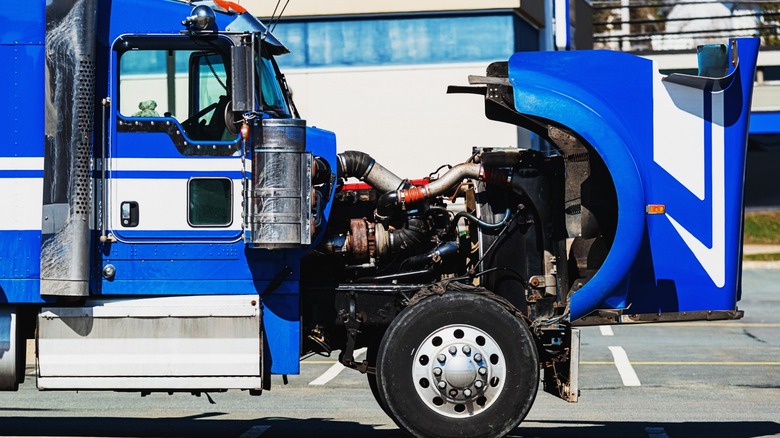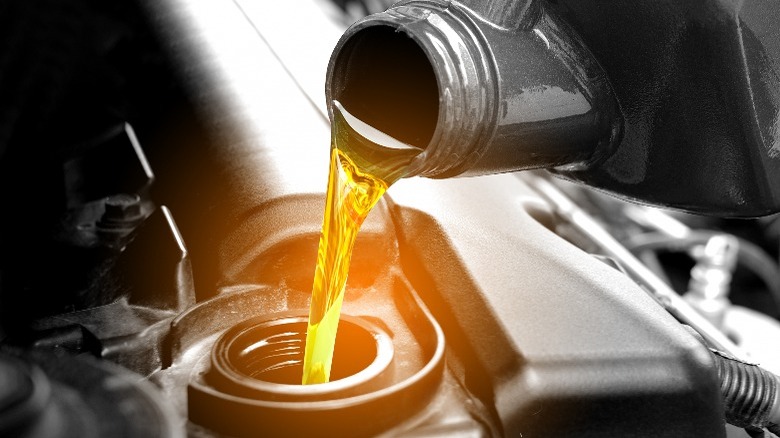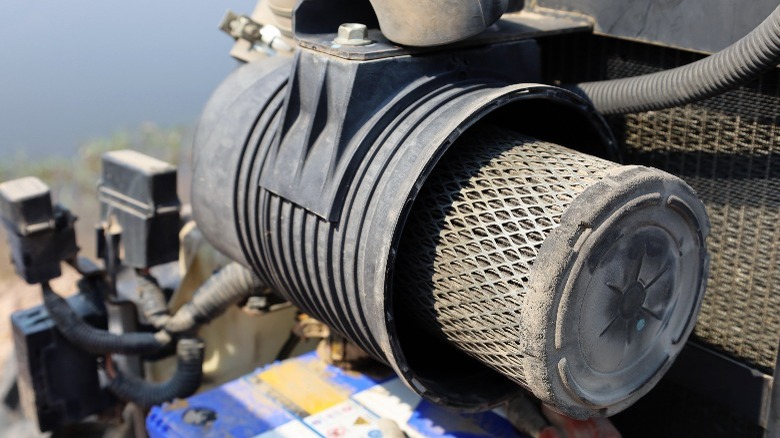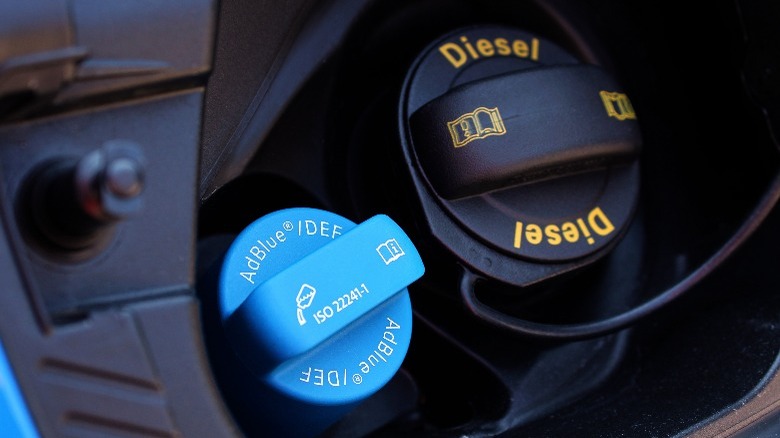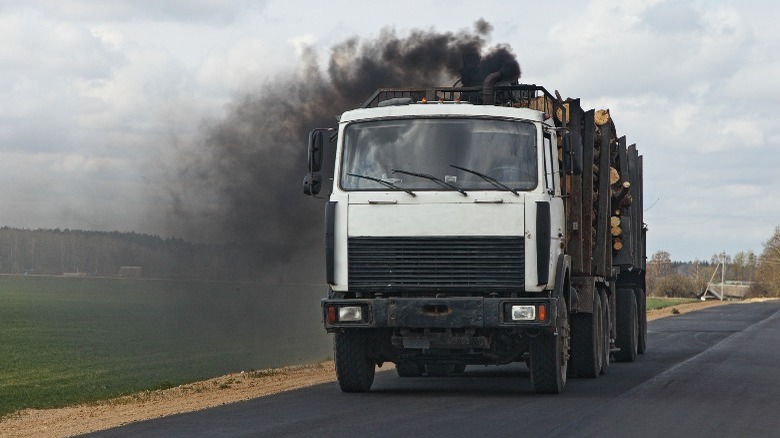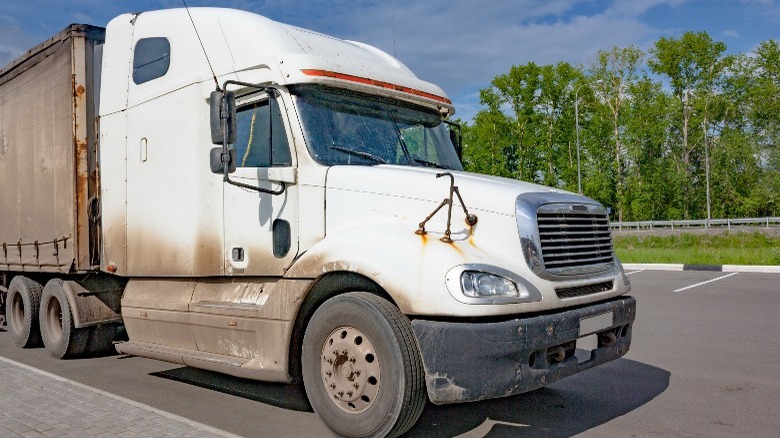6 Bad Habits That Might Be Ruining Your Diesel Engine
As indestructible as a well-built diesel engine might seem, these big monsters are really just big babies. You must treat them the same way you would treat any infant: with care, love, and attention. Being religious with this loving attitude toward your engine is the only way to help it grow to see decades in mileage. Otherwise, your expensive diesel engine may see its grave before you truly get your money's worth.
However, it's not only your inattention that could be cutting at a diesel engine's lifespan, but rather some actions — habits — you have developed over the course of your engine-handling history. Frankly, most of these habits will be pointed out if you sit down to read the owner's manual for the engine fitted into the vehicle. This is because these points fall largely in the purview of maintenance, and the maintenance schedule varies widely depending on the maker, engine displacement, and layout.
Nonetheless, we've helped compile a list of some dos and don'ts. Once again, the specifics will vary according to your type of engine, but the rules and ideology behind them remain the same.
You skip engine oil changes
Everyone knows how important it is to have engine oil flowing through your engine, but some people choose to neglect when to replace this vital fluid. Engine oil doesn't last a "ifetime. It gets corrupted and old quite easily and wears out the more your engine is tasked.
Engine oil acts as a lubricant in internal combustion engines (ICEs), helping reduce friction between its key moving parts. Aged engine oil struggles to lubricate properly, and it can cause your engine's parts to grind harder against each other, leading to increased wear and tear. While diesel engines have oil filters that strain the oil to stop contaminants from wreaking havoc in the engine, neglecting oil changes and oil filter maintenance will cause it to build up sludge and lose its purity.
Additionally, just like doctors can take a sample of your blood to diagnose health issues, experienced engineers can tell if there's a problem based on what they find in an engine oil sample. According to MotorTrend, they could use it to tell how much wear your engine has suffered (through metal shavings) and diagnose some other serious issues. You wouldn't be able to catch these early if you don't have frequent oil changes.
You delay fuel filter and air filter maintenance
The core way a diesel engine functions is through an air-fuel mixture that combusts in your engine's cylinders. Both diesel and air must go through these respective filters before they reach the combustion chamber because your engine needs them as pure and as filtered as possible. Maintaining these filters is one of the essential diesel engine maintenance tips.
The side effect of having these filters, though, is that they will trap contaminants and possibly block air and fuel from getting to the engine in good amounts. If the pressure even gets too much, it might force some of these unwanted particles into the engine (due to filter failure).
Diesel engines also rely on fuel to cool their components. Since diesel also serves as an engine coolant, when the fuel injectors don't get enough diesel, they may also run hotter than they should. The excess heat could damage the overall system.
Neglecting your air filter has a different but similarly dire result. A blocked air filter can cause your engine to run rich, leading to poor performance, strange sounds, and reduced efficiency and mileage. Many diesel engines have turbos, and if they detect the engine isn't getting enough air, it'll be forced to work extra hard to meet the demand. Also, checking your air filter often helps you catch when it isn't fitted properly. Gaps in the air filter will let contaminants slip through and wear down the engine, lowering its life expectancy.
You don't keep the diesel tank pure (and don't check the water separator)
A diesel engine needs high-quality diesel in its tank. Try to keep anything else out of it. Of course, you can add some supported fuel additives, but you need to ensure it's safe for the engine. This might be advice for the less experienced, but you also cannot use gasoline for a diesel engine, even if you mix the two together in favor of diesel.
However, the number one thing that you have to worry about in your diesel engine's fuel tank is water. Even if you're careful not to let water get into the tank, diesel, by itself, causes condensation, and water might build up in the tank. Water is terrible because it can cause corrosion and rust, lower diesel lubrication, encourage microbial growth, and kill the engine or its fuel system entirely.
Fuel contaminants are a common problem for diesel engines. Thankfully, you'll find that most diesel tanks have a filter known as a water separator. This filter ideally has two chambers. The first one will trap larger collections of water through its hydrophobic filter, and the second will catch smaller water particles. You must drain the water separator as often as you can. It also loses effectiveness with time, so you must also replace your fuel water separator at appropriate intervals.
You ignore regular maintenance, small problems, and dashboard lights
Diesel engines generally last longer than gasoline engines, but that doesn't mean you don't need regular maintenance. Consult the engine's manual and choose how often you would like to do some routine cleaning and servicing. Have a maintenance schedule for the filters (especially the Diesel Particulate Filter). Similarly, apart from the engine oil, you should have a schedule for replacing the coolant and the often-neglected transmission or differential fluid (depending on which one your vehicle uses).
You might also be tempted to ignore signs that your engine is in distress. Engines will often give you some kind of signal (if it isn't displayed on your dashboard already) that there's something wrong. Here are a few common examples you should watch out for:
- Excessive smoke from the exhaust. Blue-tinged smoke can indicate burning engine oil, white smoke can suggest a coolant leakage, and black smoke escaping the exhaust in billows may mean your injectors are bad.
- Knocking sounds from the engine. If you hear even mild but repetitive knocking coming from the engine region, address it immediately. These can indicate major issues with the engine or its components.
- Rough idling and runaway. If you leave your vehicle running and it seems to vibrate and jump RPM way more than you remember, it's idling rough, and that can indicate issues with the engine. Engine runaway happens if you turn off the engine but it remains on. This also indicates a serious issue that needs to be addressed or risk engine failure.
You choose to cold start and rev without warming up
If you're the type to head into your vehicle early on a cold morning, start it, and immediately rev it without giving it any time to warm up, then this is your call to stop. After you cold start an engine, you must give the engine oil time to spread and achieve proper viscosity and operating temperature.
What happens when you rev the engine before letting the oil spread is you're stressing an engine that isn't well-lubricated, causing engine wear. It's even more important if you live in a place with freezing weather. If only by the tiniest fraction, your engine's components expand and contract depending on how cold or hot it is. These can cause less-than-ideal conditions that could damage your engine if you overwork it. Before you start revving your engine, look at the gauges to ensure your vehicle is at the optimal operating temperature.
Besides engine wear, poorly executed cold starts can lead to fuel inefficiency and higher operational costs. You should preheat the engine to get the engine warmed up before you crank it. When fluids like engine oil and water in your filter freeze, they get solid and can cause adverse effects.
You leave your engine to idle too frequently
It might be convenient to leave your engine running while you go to run some quick errand. You tell yourself you'll return shortly anyway, so why shut it down? This isn't great for efficiency and emissions, and it's also not good for your engine. It's one of those habits you need to stop if you now drive a diesel truck.
An idling engine is still running. The combustion process is still happening (albeit at a much slower rate), and it is using all the necessary resources to keep itself running. This means that your engine is working when it doesn't need to. The first few times you do this, the effects could be negligible, but over time, these unused engine hours will rack and snowball into less mileage and a greater risk of engine failure. This unnecessary idle will shorten the gap in your maintenance schedule as your engine oil degrades faster, carbon builds up unnecessarily, and components may need servicing and replacement earlier than normal.
